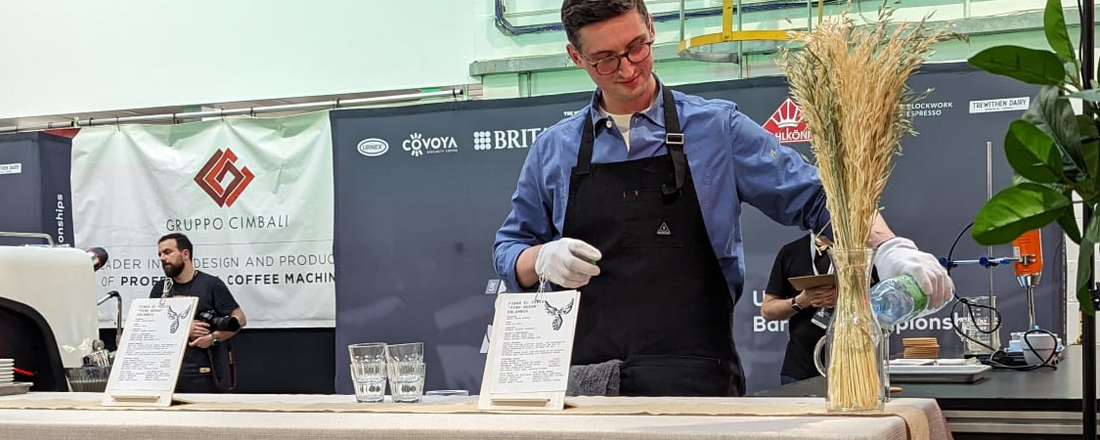A brief introduction - I am Alex, oft known as Moose, and I am the one-third of Scenery that principally deals with Coffee Sourcing, Roasting and Quality.
You may have been one of the lucky ones to have gotten a bag of Wilton's Orange Gesha from the drop online, or you may yet be able to get some of that coffee from our wonderful wholesale partners, or writing for the future, you've visited us at our stand in LCF. I think coffees like this need context, and I have thoughts about the direction of the industry around ultra-premium releases. As such, as I was unable to fulfill my routine on stage this year, I want to share those thoughts. Without further ado...
******
Coffee competitions are an interesting beast - without regurgitating a huge potted history of the entire industry, ever since the inception of the World Barista Championship (hereafter, WBC) in 2000, competitions have been a massive driving force in the development of third wave (and onwards) speciality coffee.
Coffee competitions have made careers, launched businesses, driven innovation - and it can be said without embellishment that through their influence, they have changed entire nation’s coffee consuming cultures.
The early winners of some of the world competitions are celebrities inside this industry - their cumulative impact over the years hard to understate.
The WBC rules say: the judges are looking for a champion who:
- Has a mastery of technique, craft, and communication and service skills; and is passionate about the barista profession.
- Has a broad understanding of coffee knowledge beyond the 12 drinks being served in the competition.
- Prepares and serves high quality beverages.
- May serve as a role model and a source of inspiration for others
If you compete - and you take it seriously and understand the gravitas of what it means - winning means you take on the mantle of being an ambassador for coffee itself. You will gain exposure, sponsorship, new opportunities, global fame - and I would wager the most important prize: validation, for dedicating a life and career to this industry, that oft lacks in further progression and pay opportunities. Everyone has different motivations and to compete at the elite level, you must be dedicated and fiercely competitive - sacrifices have to be made and the costs can be eye watering.
I would argue the benefit for competing is mostly held in the hands of the competitor themselves, but that isn’t to dismiss the other crucial element: placing in the top tier, nationally and on the world stage represents a huge amount of exposure for both the business the competitor represents (if they have backing), and the farm they choose to represent via coffee choice.
I’ve competed since 2018, briefly in brewers but mostly in the United Kingdom Barista Championship (UKBC). I can’t say the fiercely competitive nature applies to me - I’ve never once set my eyes on winning the top prize. What has always attracted me to competition has been the desire to innovate, to push myself to grow, and to do something a little different. Every time I’ve gone on the journey to the stage, I’ve met new people, learned new things, and got better at the skillsets. Tasted great experiments - and bad (so, so very bad)
My personal rules for competition:
- Never use the word “Judges”
- No cliches.
- Make it, Fun, Interesting, Not Boring
- It should be a genuinely pleasurable experience to judge the routine - jovial, calm, low stress, like having coffee with mates. Judges are fellow coffee lovers and industry colleagues too - not automatons
- Nothing contrived or shoe-horned in. Try and score the points without making stuff up
- It’s better to fail being authentic than to do the exact same routine as everyone else - so long as you achieve what you set out to present
In 2019, I took a 4 week rested filter roast of an El Sal Natural to UKBC heats, my first time competing in BC, alongside freeze distilled milk (which wasn’t yet as dominant as it is now). Made it to semis, but crashed and burned - I went overtime, had a potato in my coffee from Burundi so had to repull shots, and I was a stressful mess.
But I developed as a coffee professional as a result. I discovered a love for yeast inoculated coffee that year - using a washed lot from Kibingo. It was very good, but as I was soon to discover - you need a coffee that is beyond the realms of typical offer sheets to stay competitive. I think my routine was around value addition that can apply to bulk processed lots - not just the rarities and oddballs. An element that I still hold true when considering the sourcing for Scenery’s offer to this day
In 2020 I brought frozen doses of an Anaerobic natural Indonesian coffee from Team Pegasing. A lovely coffee, but a touch inconsistent - when shots were good, they were very good, and when they were bad…
I did turbo-spros (1:3 in 15s), WDT (when it was still niche), and used freeze distilled lactose free milk, using lactase enzyme to modify the lactose itself and unlock the full sugar content in the Estate dairy I processed. It was fun to watch Patrik rolf use the same technique at worlds that year after getting there first - and unsurprising to see the rules ban the addition of things like lactase in the next rules update. Judges loved my routine - with a theme of “fun, interesting, not boring” - but my espresso was not appropriate for the scoresheet. Failure to progress -
In 2023 I was lucky to represent the Finca El Fenix variety garden, using a blend of anoxic washed, natural Gesha as well as Rosado (pink bourbon). Colourful as a concept has its roots in the coffee I used on stage - taking great coffees and making them even better through synergistic blending.
I got through the heats but I lost most points because I had a bit of a caper in my signature drink - this was the final years that Alt Milks were banned from the milk round, and I used the signature drink stage to blend my own oat milk (a koji-fermented oat amazake with similar brix and fat % to freeze distilled). A last minute bit of bottling it with the ratios meant I went on stage with something less sweet and intense than in the prep, and it came off medicinal on stage - but it was funny and different and made a point about the waste in comp (what if we could m
ake milk to spec instead of discarding it constantly?)

Pic: The author during the 2024 London Heats
This year I took the opportunity to compete, taking a last minute decision. It was hard as we’re still building our location - our roastery and cafe and forever home. Being a competitor as a nomad is a very different experience to doing it while working for a large, established roastery. Through grit, and the kind advice of many people whom I’d met in my competition career, as well as the loaning of some crucial equipment - I finally got to compete taking an actual Proper Competition Coffee. And despite a lack of endless repetitive practice, I managed to scrape through to the finals. But the Work Of Running a Small Business took over, with the buildout consuming the majority of my time - I ran short. All my practice was pressed into the final few weeks and I had a family member pass away and - that, as they say - was that.
If you compete to win, frequently the routines can start to sound generic. You are serving the judges, but you are talking to the scoresheet. If you want to win, there are points to be had for being innovative (luckily more with recent rule changes) - but there are many more points to be lost by straying too far from the safe path. My biggest wish for future competition adjustments is to continue on the path of rewarding service, innovation and the promotion of holistic and shared progress (both consumer and producer for a more sustainable industry future.
My biggest concern is an effect I have witnessed in the last few years - with the explosive growth of the at-home brewing community during and post the COVID pandemic. Millions of new coffee lovers brewing at home, buying the kit, buying the coffee, paying for the premium experience - likely at a lower risk profile than a cafe bringing these lots in for mass market sale. We’ve witnessed a boom in ultra-exclusive premium lot buying - after all, if there is the demand for it, these coffees exist and are delicious. But I feel I’ve witnessed a shift in the frame of reference for quality - perhaps the best analogy would be like the political overton window. Coffees that were excellent examples of the variety/cultivar, provenance no longer had the same wow factor, the same appeal. And this tracks with the data - according to the latest speciality price transaction guide as well as research from the SCA, the price paid for 88+ scoring lots (the ultra-creme de la creme of coffee, the best of the best) has risen with the last few years whilst the prices for everything below it has only continued to sink.
My thoughts around this aren’t based around some crab bucket mentality where we try and tear down this new style, reject these new famous producers, dismiss them as less authentic or worth the value their own brands are capturing. I emphatically reject this proposition - but my thoughts are that we ought to take a careful look at how we are pitching these coffees, how we communicate about them, and what I propose is that maybe we need a new dialogue around the classic style of processing - that which is achievable to the vast majority of producers - that finds way to add value and hype for the new wave of consumers, without imposing up-stream requirements.
All the while continuing to equally value the work of these boundary breaking innovators - after all, they are excellent for the comp scoresheet and utterly delicious in their own way.
This line of thought will be continued in the next post, which will be an amended version of the script I planned to present. I will remove the specifics related to the necessary format of competition (after all, we have to talk to the scoresheet) and return some lines cut for brevity to flesh out my proposal further.

